The Children Of Leningradsky
Hanna Polak, Andrzej Celinski / Dzieci z Leningradzkiego / Poland / 2004 / 35 min / Russian
Moscow, Leningradsky Railway Station. They beg, sniff glue, drink vodka, play on the ground - and long for their mothers.
November 10. 18.00, Toldi mozi
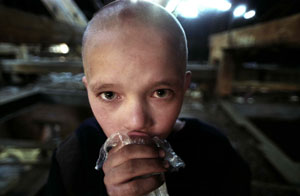 An intimate and heartbreaking chronicle of a few days in the life of a group of homeless children aged from 8 to 14, living in Leningradsky Railway Station. They spend their days begging, playing, sniffing glue, drinking vodka, and missing their mothers. They've been beaten, abandoned, abused, and discarded by drug-addicted or alcoholic parents, abusive passers-by and inhuman policemen. Many will never live to see their 15th birthdays. The camera descends into the children's murky underground dwellings or slyly captures a policeman viciously pouring glue over a young boy's head. The documentary combines footage of the
children and of the authorities, who prefer to ignore or suppress the problem. This remarkably honest, compelling journey into the hidden world of Moscow's homeless children was nominated for an Academy Award in Best Documentary Short Subject in 2004.
An intimate and heartbreaking chronicle of a few days in the life of a group of homeless children aged from 8 to 14, living in Leningradsky Railway Station. They spend their days begging, playing, sniffing glue, drinking vodka, and missing their mothers. They've been beaten, abandoned, abused, and discarded by drug-addicted or alcoholic parents, abusive passers-by and inhuman policemen. Many will never live to see their 15th birthdays. The camera descends into the children's murky underground dwellings or slyly captures a policeman viciously pouring glue over a young boy's head. The documentary combines footage of the
children and of the authorities, who prefer to ignore or suppress the problem. This remarkably honest, compelling journey into the hidden world of Moscow's homeless children was nominated for an Academy Award in Best Documentary Short Subject in 2004.
producers: Hanna Polak, Andrzej Celinski
executive producer: Sheila Nevins
screenplay: Andrzej Celinski
camera: Hanna Polak, Andrzej Celinski, Hans Jürgen Burkard
editor: Ewa Romanowska-Rózewicz, Andrzej Celinski
festival info:
IFDA, 2005 / Leeds International Film Festival, 2005 /
Tinklai, 7th International Short Film Festival, Klaipeda,
2005 / 7th International Film Festival, Bratislava, 2005 /
5th Human Rights In Film International Film Festival,
Warsaw, 2005 / Platinum Billy Goat - 23rd International
Young Audience Film Festival, Poznan´, 2006
production and sales info:
A Hanna Polak production
info@childrenofleningradsky.com
www.childrenofleningradsky.com
filmography:
Andrzej Celinski:
A Crazy World, 2003 / Grey, 2003 / A Railway Station
Ballad, 2004 / Time for Theatre, 2004 /
A Crazy World, 2004 / Kaegi, 2004
Hanna Polak:
Al, 2004
The Secret Of My Success
Duan Jinchuan / UK & China / 2002 / 59 min / Mandarin
The birth control committee tracks down an "illegally pregnant" woman. Meanwhile the local government elections take place in a village in Northern China. Never-before seen images of China.
November 11. 14.00, Toldi mozi
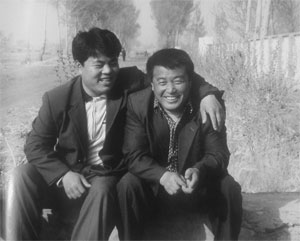 A hilarious insight into the nature of local politics in communist China, where
birth control policy plays an important role in the struggle against overpopulation.
The rural village of Fanshen in northeast China is about to hold its village council
elections, where contraception meets electoral politics. The village was given the
award for "Model Family Planning Village" in 1999. But the Birth Control Officer
Mr. Lu and his colleagues are in danger of losing their jobs when a local woman
who is pregnant with her third child flees the village, seriously violating the community's
annual quota of newborns and jeopardizing the careers of all the village
officials. Ambitious Mr. Lu will stop at nothing to keep his hold on power. The
worried officials form a search party to look for her, while Mr. Lu conspires to fix
the upcoming elections, which ultimately hinge on a question of absentee votes.
Sharply observed details of human behavior and rich, painterly cinematography
lend a fable-like quality to this microcosmic study of fledgling Chinese democracy.
A hilarious insight into the nature of local politics in communist China, where
birth control policy plays an important role in the struggle against overpopulation.
The rural village of Fanshen in northeast China is about to hold its village council
elections, where contraception meets electoral politics. The village was given the
award for "Model Family Planning Village" in 1999. But the Birth Control Officer
Mr. Lu and his colleagues are in danger of losing their jobs when a local woman
who is pregnant with her third child flees the village, seriously violating the community's
annual quota of newborns and jeopardizing the careers of all the village
officials. Ambitious Mr. Lu will stop at nothing to keep his hold on power. The
worried officials form a search party to look for her, while Mr. Lu conspires to fix
the upcoming elections, which ultimately hinge on a question of absentee votes.
Sharply observed details of human behavior and rich, painterly cinematography
lend a fable-like quality to this microcosmic study of fledgling Chinese democracy.
producer: Mark Frith
camera: Jinchuan Duan
editor: Jinchuan Duan
sound: Cheng Min
festival info:
Silver Wolf - IDFA, Amsterdam, 2002 / 5th Thessaloniki
Documentary Film Festival
production info:
Decameron Films Ltd/ACE
Mark Frith
Tel:. +44 (1453) 544 375
dec@dircon.co.uk
sales info:
TV2 WORLD
Sortedam Dossering 55 A
2100 Copenhagen
Denmark
www.tv2world.com
sales@tv2.dk
Tel:. +45 65212223
Fax.: +45 65214199
filmography:
Highand Barley, 1986 / The Sacred Site for Ascetics, 1993
/ The Square, 1995 / Man and Women in Jiada Village,
1997 / The Ends of the Earth, 1997 / No.16 Barkhor South
Street, 1997 / The Sunken National Treasures, 1999 /
The War of Love, 2002
Coca - The Dove From Chechnya
Eric Bergkraut / Coca: Die Taube aus Tschetschenien / Switzerland / 2005 / 87 min / Russian & Chechen & English & German
What's really going on in Chechnya under cover of the "War Against Terror"? Relatives of those who have disappeared without trace record their personal accounts.
November 11. 20.00, Toldi mozi
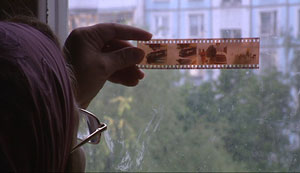 Her parents called Zainap Gashaeva "Coca" - the Dove. Born in exile in
Kazakhstan, she raised four children and became a businesswoman. Since 1994,
Zainap has been documenting what have become daily events in Chechnya: discrimination,
abduction, torture, murder. Zainap is a founder of Echoes of War, a
group of Chechen women who document the atrocities that the Russian government
has committed in Chechnya while declaring war on terror. The videos, hundreds
of them, are hidden by the women, buried under floorboards, stashed in the
backs of closets and in hollowed out walls, and smuggled out of the country by
Gashaeva and others in nondescript shopping bags as often as they can get them
out. In addition to the mountains of dusty tapes, Gashaeva and her partners have
built a database of information linking and cross-referencing facts about Chechens
who have disappeared at the hands of the state police - a painstaking record which
they hope will someday be used as a reckoning, and perhaps as a link to find out
what happened to the missing. With Chechnya closed to the international media,
Zainap Gashaeva is now bringing these tapes to the United Nations and other international
organisations to serve as evidence so that the guilty will be punished.
Her parents called Zainap Gashaeva "Coca" - the Dove. Born in exile in
Kazakhstan, she raised four children and became a businesswoman. Since 1994,
Zainap has been documenting what have become daily events in Chechnya: discrimination,
abduction, torture, murder. Zainap is a founder of Echoes of War, a
group of Chechen women who document the atrocities that the Russian government
has committed in Chechnya while declaring war on terror. The videos, hundreds
of them, are hidden by the women, buried under floorboards, stashed in the
backs of closets and in hollowed out walls, and smuggled out of the country by
Gashaeva and others in nondescript shopping bags as often as they can get them
out. In addition to the mountains of dusty tapes, Gashaeva and her partners have
built a database of information linking and cross-referencing facts about Chechens
who have disappeared at the hands of the state police - a painstaking record which
they hope will someday be used as a reckoning, and perhaps as a link to find out
what happened to the missing. With Chechnya closed to the international media,
Zainap Gashaeva is now bringing these tapes to the United Nations and other international
organisations to serve as evidence so that the guilty will be punished.
producer: Rose-Marie Schneider
screenplay: Eric Bergkraut
camera: Laurent Stoop
editor: Mireille Abramovici
music: Marie-Jeanne Serero
festival info:
Berlinale Forum, 2005 / Visions du réel, Nyon, 2005 / Tribeca Film Festival, 2005 / International Film
Festival Innsbruck, 2005 / Brisbane International Film Festival, 2005 / The World Film Festival of
Montreal, 2005 / Films from the South, Oslo, 2005 / Flanders International Film Festival, Ghent, 2005 / One World Film Festival, Bratislava, 2005 / IDFA, 2005 / Thessaloniki Documentary Film Festival, 2006
production info:
Doc Productions - Dienerstr. 7 CH-8004 Zürich
Tel: +41 44 241 1656
Fax: +41 44 241 1655
info@docproductions.ch
www.cocathedove.com
sales info:
Accent films international ltd.
Carol Spycher
46 rue de la Gare, CH-1820 Montreux
Tel: +41 21 963 93 00, mobile +41 79 631 84 14
cspycher@accent-films.com
www.accent-films.com
filmography:
Oggi siamo tutti un po' bene, 1992 / Eine Reise in den
Tod, 1992 / Das Gute Leben ist nur eine Falle, 1997 /
Kontinent K., 1998-1999 / Gesichter eines Spielers, 1999
/ Sprenge deine Grenzen, 2002 / Der fliegende Abt, 2003
White Terror
Daniel Schweizer / Switzerland & France & Germany / 2005 / 90 min / English & French & German
Trailers, spots and promotional materials available for free or for sale. Neo-Nazis from the United States through Germany, Switzerland or Sweden use the internet to spread racist ideas today.
November 10. 20.00, Toldi mozi
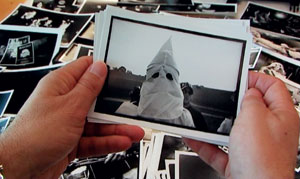 Over the past five years, new ideologists of radical far-right extremism have emerged all over Europe, North America and Russia. They do not necessarily shave their heads; they have created corporations, distribution companies, music clubs, magazines, publishing houses, internet sites and they have replaced the old symbols with new ones. With globalization taking a firmer hold and with clear demarcation lines blurring, the hate-mongers are rekindling the fires of the past, blowing on their glowing ashes. In this era of new technologies, the United States and Sweden have been deeply shocked to find their youth roused to racist violence, which has since contaminated the whole of the Western world as well as Russia and its neighbouring countries. For young Neo-nazis the past is virtual history where real cannot be distinguished from fake; their version of the future looks bleak and threatening. Daniel Schweizer investigates the forces that hide behind the 'White Power' and the 'New Racists' slogans.
Over the past five years, new ideologists of radical far-right extremism have emerged all over Europe, North America and Russia. They do not necessarily shave their heads; they have created corporations, distribution companies, music clubs, magazines, publishing houses, internet sites and they have replaced the old symbols with new ones. With globalization taking a firmer hold and with clear demarcation lines blurring, the hate-mongers are rekindling the fires of the past, blowing on their glowing ashes. In this era of new technologies, the United States and Sweden have been deeply shocked to find their youth roused to racist violence, which has since contaminated the whole of the Western world as well as Russia and its neighbouring countries. For young Neo-nazis the past is virtual history where real cannot be distinguished from fake; their version of the future looks bleak and threatening. Daniel Schweizer investigates the forces that hide behind the 'White Power' and the 'New Racists' slogans.
producer: Samir
screenplay: Daniel Schweizer
camera: Piotr Jaxa
editor: Kathrin Plüss
music: Tapani Rinne
festival info:
Sevilla Festival de Cine, Spain, 2005 / Locarno International Film Festival, Switzerland, 2005 / One World 8th International Human Rights Documentary Film Festival, Prague, Czech Republic, 2006
production info:
Dschoint Ventschr Filmproduktion
Zentralstrasse 156
Zurich
8003 Switzerland
tel: +41 145 630 20
fax: +41 145 630 25
office@dschointventschr.ch
www.dschointventschr.ch
www.whiteterror.com
sales info:
WIDE MANAGEMENT
Loic Magneron
42 bis, rue de Lourmel
Paris
75015 France
tel: +33 153 950 464
fax: +33 153 950 465
wide@widemanagement.com
www.widemanagement.com
filmography:
Various experimentals, 1980 / Derneir Amour, 1988 / Vivre avec, 1993 / Sylvie, 1995 / Skin or Die, 1998 / Helldorado, 2000 / Skinhead Attitude, 2003
Before Flying Back To Earth
Arunas Matelis /Prieš parskrendanti Žemę / Lithuania & Germany / 2005 / 52 min / Lithuanian
One practices karate and dreams of hamburgers and Coke. The other records the images that surround him. Pipes, tubes, a sterile room - children with leukemia.
November 9. 18.00, Toldi mozi
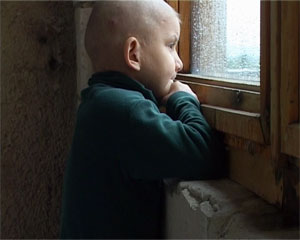 After his daughter survived eight months of treatment for leukaemia, the Lithuanian
filmmaker Arunas Matelis did not turn his back on the hospital. He filmed the kids
in the leukaemia ward in Vilnius during their day-to-day routine, without becoming
sentimental. For the parents, their worst nightmare has come true, but what do the
children themselves think? A life among medicine and tubes does not prevent them
from just carrying on. Their adaptability is incredible. The children practise karate or
dream of getting hamburgers and Coke instead of the same old cabbage soup.
The future is often brought up, as if it were not finite: they hope they will not turn
blond when their hair grows back, or they want to become a doctor, "but not in the
leukaemia ward." Before Flying Back to the Earth is interlaced with black-and-white
pictures showing the children in the middle of a smile, yawn or gesture,
momentarily freezing time in this thorough documentary that does not deal with
death, but with life.
After his daughter survived eight months of treatment for leukaemia, the Lithuanian
filmmaker Arunas Matelis did not turn his back on the hospital. He filmed the kids
in the leukaemia ward in Vilnius during their day-to-day routine, without becoming
sentimental. For the parents, their worst nightmare has come true, but what do the
children themselves think? A life among medicine and tubes does not prevent them
from just carrying on. Their adaptability is incredible. The children practise karate or
dream of getting hamburgers and Coke instead of the same old cabbage soup.
The future is often brought up, as if it were not finite: they hope they will not turn
blond when their hair grows back, or they want to become a doctor, "but not in the
leukaemia ward." Before Flying Back to the Earth is interlaced with black-and-white
pictures showing the children in the middle of a smile, yawn or gesture,
momentarily freezing time in this thorough documentary that does not deal with
death, but with life.
producers: Gerd Haag, Arunas Matelis
screenplay: Arunas Matelis
camera: Audrius Kemezys
editor: Katharina Schmidt
sound: Viktoras Juzonis
music: Kipras Masanauskas
festival info:
Golden Dove - International Leipzig Festival for Documentary And Animation, 2005 / Big Stamp Award -
Zagreb Dox International Documentary Film Festival / Thessaloniki Documentary Film Festival, 2005 / First
Prize - International Documentary Festival Documenta Madrid, 2006 / Spirit Award - International Brooklyn
Film Festival / Grand Prix - 20th Pärnu International Documentary and Anthropology Film Festival, 2006
production info:
Studio "Nominum"
Nemencines pl. 4
Vilnius
LT-1 Lithuania
tel: +370 612 410 12
fax: +370 523 731 53
arunas@nominum.lt
www.nominum.lt
sales info:
First Hand Films
Schaffhauserstrasse 359
Zürich
8050 Switzerland
tel: +41 131 220 60
fax: +41 131 220 80
esther.van.messel@firsthandfilms.com
www.firsthandfilms.com
filmography:
Giants of Pelesa, 1989 / Baltic Way, 1989 / Ten Minutes Before the Flight of Icarus, 1991 / Self-portrait,
1993 / From Unfinished Tales of Jerusalem, 1996 / First Farewell to Paradise, 1998 / The Diary of Forced
Emigration, 1999 / Flight over Lithuania or 510 Seconds of Silence, 2000 / Sunday. The Gospel According
to Liftman Albertas, 2003
I Never Want To Be Famous
Mercedes Stalenhoef / Ik wil nooit beroemd worden / The Netherlands / 2005 / 75 min / Dutch
Tobias was a celebrated cellist. A stroke confined him to a wheelchair. He's fed, washed and changed. Would he choose life if he were aware of living? A film about life, death and euthanasia.
November 12. 16.00, Toldi mozi
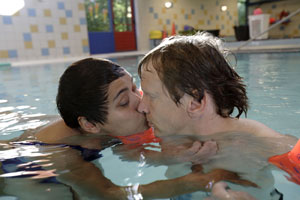 "I don't ever want to be famous", Tobias mumbles. Tobias is a seriously disabled
man and a great Bach enthusiast. Before he went into cardiac arrest and was left
handicapped, he was a successful cellist. Now he is in a wheelchair suffering
from spastic paralysis and unable to understand very much. By means of archival
footage of concerts, photographs and memories of his relatives and a good friend,
a picture emerges of the former Tobias, Tobias the cellist. This image is interwoven
with images of Tobias today and his life in an institution for the mentally disabled.
The contrast between these two worlds illustrates the tough issues Tobias's
relatives must grapple with. How much of Tobias is still there? Would he have
wanted to live like this? Would it be better if the heart failure had been fatal, or
can Tobias still enjoy life? Candidly and sincerely, his relatives and friends discuss
the dilemmas that confront them. Tobias himself is hardly, if at all, aware of
the questions surrounding him. He enjoys Bach, cries when people leave and
says he wants to live to be a thousand years old.
"I don't ever want to be famous", Tobias mumbles. Tobias is a seriously disabled
man and a great Bach enthusiast. Before he went into cardiac arrest and was left
handicapped, he was a successful cellist. Now he is in a wheelchair suffering
from spastic paralysis and unable to understand very much. By means of archival
footage of concerts, photographs and memories of his relatives and a good friend,
a picture emerges of the former Tobias, Tobias the cellist. This image is interwoven
with images of Tobias today and his life in an institution for the mentally disabled.
The contrast between these two worlds illustrates the tough issues Tobias's
relatives must grapple with. How much of Tobias is still there? Would he have
wanted to live like this? Would it be better if the heart failure had been fatal, or
can Tobias still enjoy life? Candidly and sincerely, his relatives and friends discuss
the dilemmas that confront them. Tobias himself is hardly, if at all, aware of
the questions surrounding him. He enjoys Bach, cries when people leave and
says he wants to live to be a thousand years old.
producers: Niek Koppen, Jan de Ruiter for Self Made Films
screenplay: Mercedes Stalenhoef
camera: Peter Brugman, Erik van Empel
editor: Gys Zevenbergen
sound: Bouwe Mulder
festival info:
IDFA, Amsterdam, The Netherlands, 2005 / International Film Festival, Rotterdam, The Netherlands, 2006
production and sales info:
Selfmade Films
Willemsparkweg 63
1071 GS Amsterdam
The Netherlands
Tel: + 31 20 3058555
Fax: +31 203058550
mail@selfmadefilms.nl
www.selfmadefilms.nl
filmography:
I just take my toys with me, 2001 / Godofredo lives, 2004
